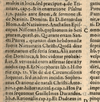Some of the father's said Christ was born on a Friday but others, and a sixth synod of somewhere specifically, declared it was a Lord's Day? Voetius calls it the Sixth of Constantinople but the source he likely draws from does not say that but merely the sixth synod? Any ideas. I've scoured the sixth of Constantinople (third general) but can't find it.
Voetius:

Voetius's souce:

Voetius:

Voetius's souce:

